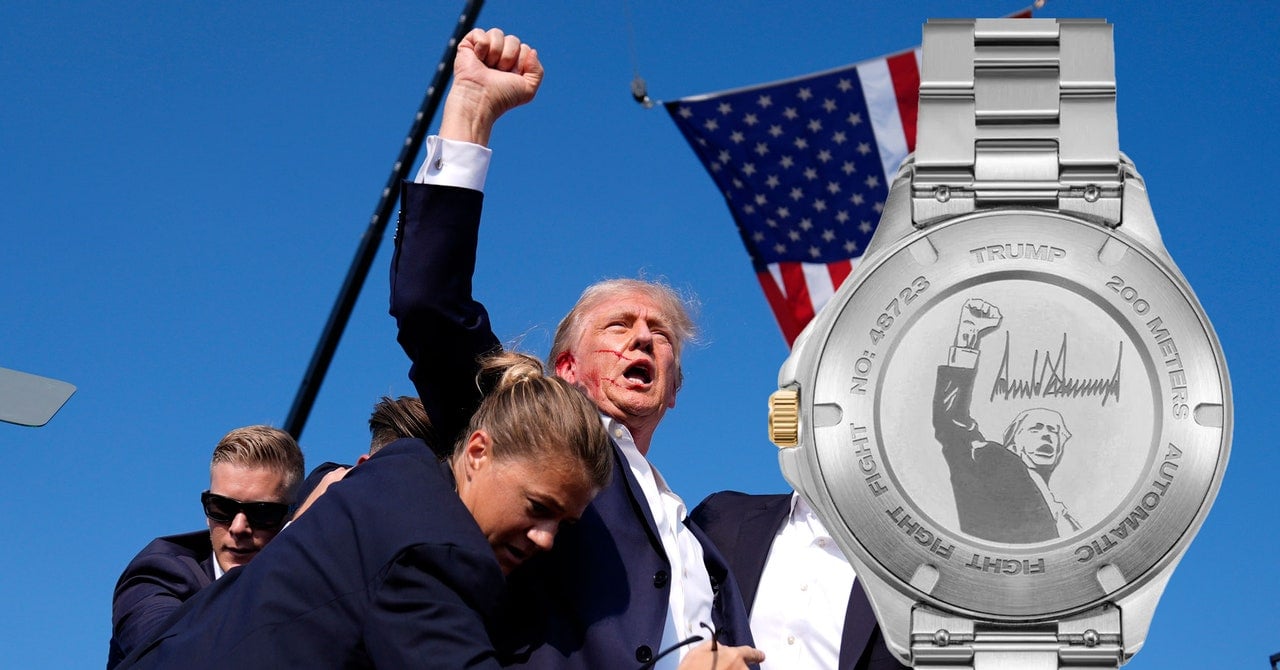The company behind Trump Watches prominently features an iconic image of the presidential candidate on its timepieces. There’s one big problem: It’s not allowed to.
…
According to the Associated Press, though, TheBestWatchesonEarth LLC advertised a product it can’t deliver, as that image is owned by the 178-year-old news agency. This week, the AP told WIRED it is pursuing a cease and desist against the LLC, which is registered in Sheridan, Wyoming. (The company did not reply to a request for comment about the cease and desist letter.)
Evan Vucci, the AP’s Pulitzer Prize–winning chief photographer, took that photograph, and while he told WIRED he does not own the rights to that image, the AP confirmed earlier this month in an email to WIRED that it is filing the written notice. “AP is proud of Evan Vucci’s photo and recognizes its impact,” wrote AP spokesperson Nicole Meir. “We reserve our rights to this powerful image, as we do with all AP journalism, and continue to license it for editorial use only.”



Actually no, when you go to a professional photographer to have your picture taken, you pay for it. Because they put in the work and need to be compensated for it. By that logic people would never have to pay photographers for portraits, weddings, none of that. Just because you’re in a picture doesn’t mean you don’t owe a debt to the person who took it.
Hm yes, but if someone takes a picture of me without me asking for it that’s different
It is different only in that - in some jurisdictions at least - you can ask for the picture to be taken down or destroyed, and then not if you are a public person appearing in public like Trump is in this case. But that still does not give you the right to use the picture for your own gain without compensating the photographer. Because then you clearly not only have no objections to the picture being taken, but you value that picture, want to use it publicly, commercially even, and again, you owe a debt to the person who took it and in fact depends on people paying for their pictures for their livelihood.
Only if you’re in a public place without a reasonable assumption of privacy (or whatever the specific legal wording is).
You’re not coming up with some clever loophole, all of this has been litigated already in the past.
One of the first lessons we learned when I took a photography class in high school is that it’s legal to take photos of people in public places. Just try not to be a dick about it.
Yeah, but if I then want to put that picture of me on my social media page or a website or the back of a cheaply-manufactured wristwatch or what have you, why is the photographer allowed to tell me no?
Because you don’t own the image. You are not images of yourself. Are you one of those people that thinks cameras steal a part of your soul or something? This isn’t difficult to understand.
Considering it’s me in the picture, and thus my reputation on the line if it gets misused, I think I should have some say.
Thanks for strawmanning me though.
Well. You don’t.
Well, that’s stupid.
Well if you want an argument based on ‘first principles’, because the photographer actually put work into producing this picture, let alone their knowledge, likely expensive equipment, and hard earned skill to take a truly great shot, whereas you did nothing for it. Unless you are a professional model, but then you probably got compensated for your work as part of a deal.
Now the uses you describe are very different. Some are more casual and non-commercial in nature. Courts will consider such factors in a copyright infringement case.
Now does the above mean you have absolutely no say in what happens to a picture of you taken by someone else? Not exactly, you can also prevent third parties from using the likeness of you for purposes that might be damaging to your dignity or reputation, again, in some jurisdictions, I do not know the details. I am not a lawyer and it was a long time ago I studied these subjects. But basically my point is that the fact that it’s you in the picture may matter to an extent, depending on laws protecting personhood in your country, but not in the way you assumed where every photo of you is yours for the taking.